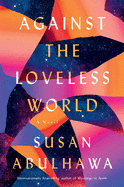
| Publisher: | Atria | |
| Genre: | Cultural Heritage, Literary, Political, Fiction | |
| ISBN: | 9781982137038 | |
| Pub Date: | August 2020 | |
| Price: | $27 |
| Fiction |
by Susan Abulhawa
Returning to the Palestinian multigenerational epic format that made her debut novel, Mornings in Jenin (2010), an international bestseller, Susan Abulhawa's haunting Against the Loveless World features another extended Palestinian clan enduring exile, surviving persecution and (sometimes) cheating death.
Abulhawa's compelling protagonist is a woman with four names, each imbued with significant meaning. Born in Kuwait, her 1967 birth certificate identifies her as Yaqoot, chosen by her father without her mother's consent, a nod to the first of his many mistresses. Her mother called her Nahr, meaning river, honoring the River Jordan she crossed while pregnant to escape what would be declared the Six Day War. She was Nanu to her beloved younger brother, for whose education she would later become Almas, meaning diamond, made resistant but valuable. As a middle-aged woman, she's imprisoned in Israel, condemned as a terrorist. Trapped in high-tech solitary confinement, she's secured a pencil, then paper, after a long battle with the guards. "I stare at the blank pages now, trying to tell my story." And so, she begins: "My life returns to me in images, smells, and sounds, but never feelings. I feel nothing." With that detachment in place, Nahr--her preferred moniker "for the purer part of [her]"--reveals a difficult, rebellious life.
Like Nahr, Abulhawa was born in Kuwait in 1967 to Palestinian exiles who fled the Six Day War. Through Nahr, Abulhawa affectingly parallels Palestine's brutal, occupied history during the last half-century, humanizing headlines about people with whom readers can identity, believe, empathize, mourn and ultimately, albeit tentatively, celebrate. --Terry Hong, Smithsonian BookDragon
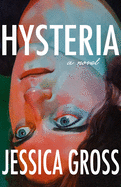
| Publisher: | Unnamed Press | |
| Genre: | City Life, Literary, Fiction, Jewish | |
| ISBN: | 9781951213121 | |
| Pub Date: | August 2020 | |
| Price: | $18 |
| Fiction |
by Jessica Gross
Jessica Gross's debut novel, Hysteria, is a heated, propulsive dive into a troubled young woman's all-night bender. An unnamed protagonist's sexual exploits have been getting increasingly out of control. After a double-header of sleeping with her psychiatrist parents' middle-aged colleague and her beloved roommate's off-limits brother, she senses she's hit rock bottom. To numb her desire, she starts her day drinking at a local dive bar, only to find that the bartender bears an uncanny resemblance to Freud. Over the course of the next 24 hours, a series of dizzying interactions with this Freud-figure brings her to the brink of self-discovery.
Gross's prose conveys casual brilliance, highlighting the extraordinary in the mundane in a way that helps ground the novel's dreamlike plot. Throwaway descriptions, such as how a character's "feet were long and delicate, like greyhounds" paint impressionistic, surreal images that are nonetheless vivid in their accuracy. The narrator, a pitch-perfect millennial flâneur, encounters every sexual act and bizarre situation with deep-gutted melancholy, conjuring a hard-edged eroticism and slow-burn tension that propels readers forward.
As the protagonist falls headlong into her downward spiral, readers, too, may begin to experience her fear of seeming unwell, and question every act as a potential coping mechanism against that perception. Thus, the novel becomes the ultimate example of a clever and deeply felt character study, asking readers to consider their own self-implication when making a study of the character. --Alice Martin, freelance writer and editor
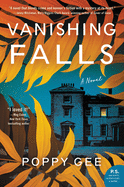
| Publisher: | Morrow | |
| Genre: | Women, Mystery & Detective, Amateur Sleuth, Suspense, Thrillers, Fiction | |
| ISBN: | 9780062978493 | |
| Pub Date: | August 2020 | |
| Price: | $16.99 |
| Mystery & Thriller |
by Poppy Gee
Poppy Gee (Bay of Fires) has created a brooding literary thriller in Vanishing Falls. The town of Vanishing Falls, Tasmania, is in the middle of the winter rainy season, which lasts until spring begins in October. Once a prosperous village of apple farmers, the town now has significant unemployment, and meth addiction is a rapidly growing problem. Jack and Celia Lily, wealthy heirs to the Calendar House, built by some of the earliest colonists, live much better than most people in Vanishing Falls.
But one night, Jack comes home to discover his four daughters asleep, the front door of the Calendar House ajar and his wife missing. Jack, a defense lawyer, knows he's likely to be the first suspect, and starts hunting desperately for Celia.
Meanwhile, Joelle Smithton, the butcher's wife, knows a secret about Jack. Many people in Vanishing Falls think that Joelle is simple-minded, but her brain just works a little differently than most people's, as a result of an awful childhood trauma. Joelle becomes increasingly anxious that if she reveals what she knows, her own secrets will be uncovered.
Tense and atmospheric, the heavy rain that permeates the story is an apt metaphor for the dark secrets that many of the residents of Vanishing Falls are hiding. As Gee delicately unveils the truths in the Lily and Smithton marriages, readers are taken along on a journey of discovery. Fans of Jane Harper and Camilla Läckberg are sure to enjoy this familial thriller. --Jessica Howard, bookseller at Bookmans, Tucson, Ariz.
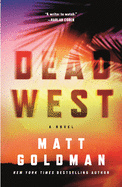
| Publisher: | Forge | |
| Genre: | Private Investigators, Mystery & Detective, Crime, Thrillers, Fiction, Jewish | |
| ISBN: | 9781250191342 | |
| Pub Date: | August 2020 | |
| Price: | $26.99 |
| Mystery & Thriller |
by Matt Goldman
A wealthy couple offers Minneapolis private investigator Nils "Shap" Shapiro an assignment that sounds like a paid vacation: fly to California to make sure the couple's only grandson, Ebben, is spending his trust fund responsibly. It's frigid in Minneapolis and sunny in Los Angeles, so why not? Of course, the job is too good to be true. Like the previous three books in this series (including The Shallows), Emmy-winner Matt Goldman's engaging Dead West starts out breezily but a dead body is lurking just around the corner.
It takes Shap about five minutes after meeting Ebben to determine Ebben is indeed handling his finances in a savvy way--he's formed a film collective that requires a small investment of his money but promises healthy profits. Not all is rosy, though: Ebben is grieving the recent accidental death of his fiancée, Juliana, and it takes Shap only another five minutes to detect that Juliana was murdered. And Ebben might be next.
Shap is a winning combination of wit, decency and smarts, a man touchingly dedicated to his fiancée, best friends and baby daughter. He could be labeled a square but he's entertaining, such as in this observation of a client: "His neck was too small for his white dress shirt--the shirt didn't touch his neck the way Saturn's rings don't touch Saturn." In Goldman's world, even the bad guys are funny, and the author gives an amusing peek into the behind-the-scenes hustle of the movie industry. Readers don't need to have read other books in the series, but they'll probably want to after finishing this sharp and sweet installment. --Elyse Dinh-McCrillis, blogger at Pop Culture Nerd
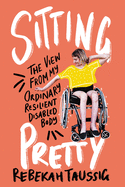
| Publisher: | HarperOne | |
| Genre: | Biography & Autobiography, People with Disabilities, Personal Memoirs, Social Activists, Literary Collections, Social Science, Essays | |
| ISBN: | 9780062936790 | |
| Pub Date: | August 2020 | |
| Price: | $25.99 |
| Biography & Memoir |
by Rebekah Taussig
A candid and engaging memoir-in-essays, Sitting Pretty: The View from My Ordinary Resilient Body offers readers deep insight and broad perspective on disability, as reflected in Rebekah Taussig's life.
Taussig, an independent woman, successful educator and prolific Instagrammer (@sitting_pretty), became paralyzed at age three following treatment for childhood cancer. Because her parents didn't treat her any differently than her five siblings--several years passed before she got her first wheelchair--Taussig initially didn't see herself as disabled. "I continued to sleep on the top bunk on the top floor of the house." Like many young children, "I believed that I was royally beautiful, valuable, and fully capable of contributing to the group." That idyllic view changed as she began to understand--often painfully--how society considered people like her. "I consumed and digested the culture around me and slowly learned, with certainty, that I was not among those who would be needed, admired, wanted, loved, dated, or married."
This groundbreaking memoir immediately draws the reader into Taussig's world with a casual, witty and confident tone. While acknowledging her privilege and position as someone who is highly educated (she holds a Ph.D. in disability studies), Taussig conveys that her greatest struggles aren't always physical. Sitting Pretty poignantly demonstrates that the biggest obstacle is the common inability to see past disability so that all people can be fully accepted and integrated into society. This book is a necessary addition to the voices that may help get everyone there. --Melissa Firman, writer, editor and blogger at melissafirman.com
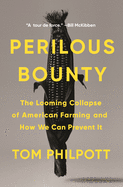
| Publisher: | Bloomsbury | |
| Genre: | Technology & Engineering, Agriculture & Food (see also Political Science, Public Policy, Agriculture & Food Policy, Sustainable Agriculture, Agriculture, Social Science, Public Policy - Agricultur, Political Science | |
| ISBN: | 9781635573138 | |
| Pub Date: | August 2020 | |
| Price: | $28 |
| Social Science |
by Tom Philpott
Tom Philpott is a food and agriculture correspondent for Mother Jones. His precise and pointed survey, Perilous Bounty, reveals the waste, inefficiency and destructiveness of contemporary American agriculture. He pays special attention to the bone-dry Central Valley of California, where almond planters tap the dregs of the aquifer to irrigate the thirstiest of crops, and the Midwestern Corn Belt, where farmers forgo a topsoil-preserving rotation of crops in favor of the corn and soybeans that insurance and government subsidies make a sure economic bet. Iowa's harvest doesn't feed the world, exactly--instead, it feeds the region's factory-farm livestock whose abundant fecal waste joins the farmers' herbicides in polluting streams and rivers, contributing to poison algae blooms in Lake Erie and a "dead zone" the size of New Jersey where the Mississippi meets the Gulf of Mexico.
With patient, quiet outrage and persuasive testimony from experts, Philpott makes the case that American farming faces multiple looming crises: topsoil erosion, water scarcity, climate change, weeds that constantly develop new resistances to expensive herbicides and increasing awareness of the health hazards of the American diet. Perilous Bounty identifies a common denominator linking these problems: the interests of agribusiness, the "oligopoly" of companies invested in the status quo. Philpott documents that Corn Belt farmers are incentivized not to adopt more sustainable methods--and how, in California, the wealthiest planters command the limited water. These choices, he argues, are made according to the efficiencies of markets rather than concern for the public good. He makes the case with such power that the book's final notes of hope sound wan by comparison. --Alan Scherstuhl, freelance writer and editor
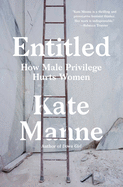
| Publisher: | Crown | |
| Genre: | Feminism & Feminist Theory, Ethics & Moral Philosophy, Gender Studies, Women's Studies, Social Science, Philosophy | |
| ISBN: | 9781984826558 | |
| Pub Date: | August 2020 | |
| Price: | $27 |
| Social Science |
by Kate Manne
What do mansplainers, husbands who slack on housework and Supreme Court Justice Brett Kavanaugh have in common? According to Kate Manne, it's a sense of male entitlement, an entrenched social system that shafts women. In the scholarly but nevertheless eminently readable Entitled: How Male Privilege Hurts Women, Manne sets out to expose how "misogyny, himpathy, and male entitlement work in tandem with other oppressive systems to produce unjust, perverse, and sometimes bizarre outcomes."
In essay-like chapters, each zeroing in on a specific aspect of entitlement, Manne (Down Girl: The Logic of Misogyny) shows how male privilege can inform everything from how rapes are prosecuted to how medical care is administered and pain medication is prescribed: "Women are regarded as more than entitled (indeed obligated) to provide care, but far less entitled to ask for and receive it." Male entitlement flagrantly powers the grievances of incels (self-described involuntary celibates), and it can fuel the violence perpetrated against transgender people (the aggression can stem from the assailant's sense of entitlement to know the victim's biological sex). Manne pounces on news stories to point out entitlement at work and anatomizes some famous examples; beyond the Kavanaugh confirmation hearing, she looks at the falls of film mogul Harvey Weinstein and former senator Al Franken.
Entitled is a valuable addition to any social-justice library. Manne's thesis, shored up by copious research, will be hard to refute, although her book's abundance of buzzy neologisms ("himpathy," "herasure," and so on) may incline some readers to try. --Nell Beram, author and freelance writer
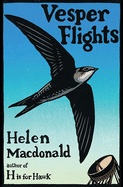
| Publisher: | Grove Press | |
| Genre: | Nature, Literary Collections, Essays | |
| ISBN: | 9780802128812 | |
| Pub Date: | August 2020 | |
| Price: | $27 |
| Starred | Nature & Environment |
by Helen Macdonald
In Vesper Flights, Helen Macdonald (H Is for Hawk) showcases her affinity for the essay in her quest for readers to see "the glittering world of non-human life around us," and see it through other eyes, to realize the world does "not belong to us alone. It never has done."
Topics include a captive wild boar provoking introspection about Macdonald's place in the world; the territorial anxiety over wild animals "intruding" in human spaces; an autistic boy's mutual delight with Macdonald's parrot; a young refugee smuggled into the U.K.; and the complexity of avian navigation.
The poet in Macdonald moves these subjects toward mystery. A night flight of migrating birds delicately amazes: "Watching their passage is almost too moving to bear. They resemble stars, embers, slow tracer fire." A peregrine falcon seems to make the atmosphere heavier as it flies, "the barred feathers of his chest, his black hood, a faint chromatic fringe ghosting him with suggestions of dust and rainbows. He's exquisite, the colour of smoke, paper and wet ash."
She crafts brilliant descriptions, drawing wisdom from her observations: "It's true that time walking in a forest can be beneficial to our mental health. But valuing a forest for that purpose traduces what forests are: they are not there for us alone." She takes hard-won emotional solace from "knowing that animals are not like me, that their lives are not about us at all."
Helen Macdonald set the bar high with H Is for Hawk; with Vesper Flights, she still soars into the ether. --Marilyn Dahl
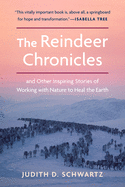
| Publisher: | Chelsea Green | |
| Genre: | Nature, Sustainable Development, Science, Sustainable Agriculture, Ecology, Natural Resources, Life Sciences, Technology & Engineering, Environmental Conservation & Protection, Business & Economics, Development, General, Agriculture, Global Warming & Climate Change | |
| ISBN: | 9781603588652 | |
| Pub Date: | August 2020 | |
| Price: | $17.95 |
| Nature & Environment |
by Judith D. Schwartz
These days it seems that environmental news is always bad. But as journalist Judith Schwartz (Water in Plain Sight) observes in The Reindeer Chronicles: And Other Inspiring Stories of Working with Nature to Heal the Earth, fear tends to be self-fulfilling. If people think there's no hope, what's the point of working to make things better? This book provides hope that devastated ecosystems can be revived, and that it requires doing more than just letting nature take its course.
Although there are reindeer in the title, this book is less about wildlife and more about things like the water cycle. The projects described start with a deep understanding of how a local ecosystem functions, which allows them to jump-start a natural healing process. The results are landscapes that are more productive for the people who depend on them--livestock, even, can be part of the process--so it's not a matter of choosing pristine nature over struggling locals. What's more, there can be broader effects, such as when the return of healthy vegetation results in increased rainfall.
Some chapters are more encouraging than others--while Schwartz had fascinating conversations with people in Hawaii, they don't provide a specific success story with a clear takeaway. There may also be a bit too much first-person detail for the reader who doesn't care about the color of the author's raincoat. Despite those quibbles, this is a book that is very much worth reading for anyone who cares about the state of the planet. --Linda Lombardi, writer and editor
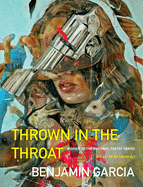
| Publisher: | Milkweed Editions | |
| Genre: | American, Family, Poetry, Subjects & Themes, LGBT, Hispanic American | |
| ISBN: | 9781571315212 | |
| Pub Date: | August 2020 | |
| Price: | $16 |
| Starred | Poetry |
by Benjamin Garcia
Thrown in the Throat by Benjamin Garcia is an unabashed celebration of complexity in queerness and gender, an arresting snapshot of survival and a triumphant reclamation of language.
With a musicality that encourages reading aloud, Garcia's poetry tackles difficult topics--being undocumented in the U.S., familial and institutional violence, addiction, suicide and society's discomfort with queer desire. "If you want to keep America America, better bolt it/ down or lock it," says one immigrant speaker, using images of cages and swallowed rainbows and tongues to convey his sense of difference. Such difference is relished in "Queso de Patas," wherein a mother is likened to Mexican cheese, "ungrated as she tread upon this foreign soil."
The collection unpacks the harmful layers hidden in language. "Wouldn't you like to have a dress as wonderful as a rose petal? Well, not you," a mother tells her child, denying her "handsome boy" the beauty reserved for girls. Garcia rails against this "claustrophobic" dichotomy of "boy or girl, left or right, right or wrong," slamming verbiage that tries to fit LGBTQ lives into "heteronormative birds & bees" narratives, that assumes a "flower" to be likable or that suggests "orientation doesn't matter." At the same time, he disparages speech that tiptoes around anything offensive, which thereby others those who wield such words positively. Elevating this message, Garcia's brilliant wordplay shatters the taboo of supposed vulgarities, particularly sexual ones: he ponders the Spanish "come" in its varying English meanings and has the reader say "masturbation" aloud. By thwarting expectation, Thrown in the Throat fervidly asserts the possibilities for self-acceptance and belonging in the face of intolerance. --Samantha Zaboski, freelance editor and reviewer
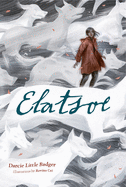
| Publisher: | Levine Querido | |
| Genre: | United States - Native American, Paranormal, Occult & Supernatural, People & Places, Mysteries & Detective Stories, Young Adult Fiction | |
| ISBN: | 9781646140053 | |
| Pub Date: | August 2020 | |
| Price: | $18.99 |
| Starred | Children's & Young Adult |
by Darcie Little Badger, illust. by Rovina Cai
Darcie Little Badger's creative and meticulously plotted YA debut, Elatsoe, is a supernatural murder mystery that takes place in a United States that has Fairy Ring Transportation Centers, endless fields of scarecrows with human eyes and a rich history of Lipan Apache ghost whisperers.
When Elatsoe's ghost dog, Kirby, throws a fit, she knows something is very wrong. Turns out, Ellie's cousin Trevor was in a fatal car accident. That night Ellie, whose "family secret" is the knowledge of how to bring back the dead, dreams of Trevor. "A man named Abe Allerton murdered me," he tells Ellie. "Don't let Abe hurt my family." Ellie's mother and father believe that Ellie is as powerful as her Six-Great-Grandmother who traveled Lipan Apache territory saving her people from undead evils, dangerous creatures and deadly settlers. Knowing the strength of his daughter's gift, Ellie's father agrees to help her investigate. With the assistance of her parents and her good friend and Lord Oberon descendant, Jay, Ellie takes a trip across Texas to find Abe Allerton and bring him to justice.
Little Badger excellently balances humor and horror in this inventive YA mystery/alternate history/fantasy. Ellie is a very likable protagonist whose Lipan heritage and ethnicity is not just twined with the story, but is the story: her gift comes from Six-Great; she's vocal about the contemporary mistreatment of Indigenous people; and she has a pretty ingenious way of dispelling vampires. Each chapter begins with graceful, almost ethereal black-and-white illustrations by And the Ocean Was Our Sky artist Rovina Cai, adding to the evanescent vibe of the book, a Lipan Apache Sookie Stackhouse for the teen set. One hopes Ellie--and the wonderfully developed world in which she lives--will appear in many more books to come. --Siân Gaetano, children's and YA editor, Shelf Awareness

| Publisher: | Roaring Brook Press | |
| Genre: | Romantic Comedy, Satire, Romance, Coming of Age, Young Adult Fiction | |
| ISBN: | 9781250206237 | |
| Pub Date: | August 2020 | |
| Price: | $18.99 |
| Children's & Young Adult |
by Shannon Hale
A down-on-her-luck teen singer-actress literally escapes into the world of reading in Kind of a Big Deal, a hilarious genre-hopping fantasy romp from the versatile Shannon Hale (Best Friends; the Princess Academy series).
Josie Sergakis was a big deal in high school, but a stint in New York City trying to break into musical theater saddled her with credit card debt and shattered dreams. Flat broke, Josie follows her job as adorable five-year-old Mia's au pair to Missoula, Mont., where she can't even get the respect of the other nannies. At the local bookstore she meets Deo, "the kind of guy she imagined trophy wives would hire to be the pool boy, if they lived in a state where pools were a thing." The flirty bookseller recommends a romance novel, and Josie finds herself magically transported into the story, where her singing captivates the characters. Amazed, she reads herself into other stories, facing down zombies and channeling magical forces. What starts as investigative curiosity quickly turns into a way to avoid facing failure, money worries and troubled relationships with her long-distance sweetheart Justin and best friend Nina. However, magic comes with a price, and if Josie isn't careful, she could end up lost in a book forever.
Hale lovingly lampoons tropes from a smorgasbord of genres, even dropping Josie into a graphic novel sequence illustrated by Samantha Richardson [art not seen]. Never taking itself too seriously, this quirky, clever tale of confidence lost and found aims for the hearts of bookworms but has a sassy-sweet message with broad young adult appeal. --Jaclyn Fulwood, youth services manager at Main Branch, Dayton Metro Library